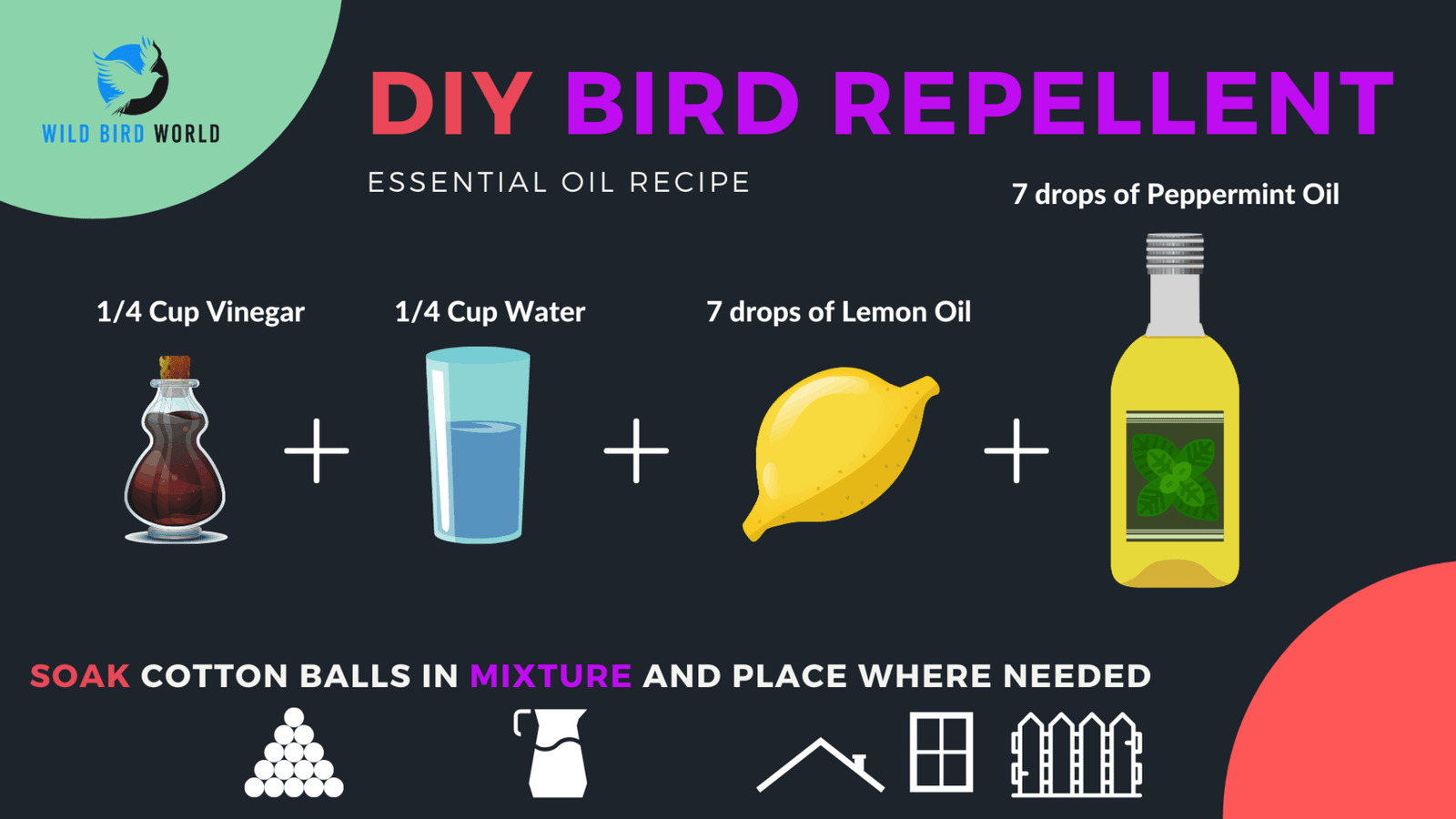
Birds are generally repelled by strong, pungent odors like those found in essential oils (peppermint, eucalyptus, lavender, citronella, and lemongrass), as well as other natural scents such as garlic, cayenne pepper, and apple cider vinegar.
By strategically applying these smells around your property, you can effectively repel birds and keep them away.
Applying these smells effectively can be difficult but this is where this article can help. Here is a comprehensive list of smells that birds hate!
What smells repel birds?
Are you wondering what smells repel birds? The answer lies in a combination of natural and commercial solutions, such as bird-repellent gels, peppermint oil, garlic, cayenne pepper, professional products, and chili pepper mixes. These powerful scents can help deter birds from your property, providing a more peaceful environment.
1. Bird Gel
One product that plays with a bird’s sense of smell is this bird-repellent gel.
Smelling of peppermint oil, this product also plays with birds’ sense of touch and sight. The gel emits ultraviolet light which in combination with its smell and texture gives birds the sensation of fire.
The bird gel will be effective up to 4 years after first use.
The only downside of this product is that it is fairly pricey however it is known to be an effective deterrent for birds.
2. Peppermint Oil
Peppermint oil and other essential oils have become very popular for a wide range of uses. None more so than to deter birds.
Birds find peppermint oil to be highly offensive which makes this a great solution as it smells great to most humans.
The best way to apply peppermint oils is:
Mix these:
- 1/4 cup vinegar
- 1/4 cup water
- 7 drops of lemon oil
- 7 drops of peppermint oil
Soak cotton balls in this mixture and scatter them in locations where birds are being a nuisance!
Ensure that you regularly re-apply this solution to the cotton balls as the pungency of the mixture does fade over time.
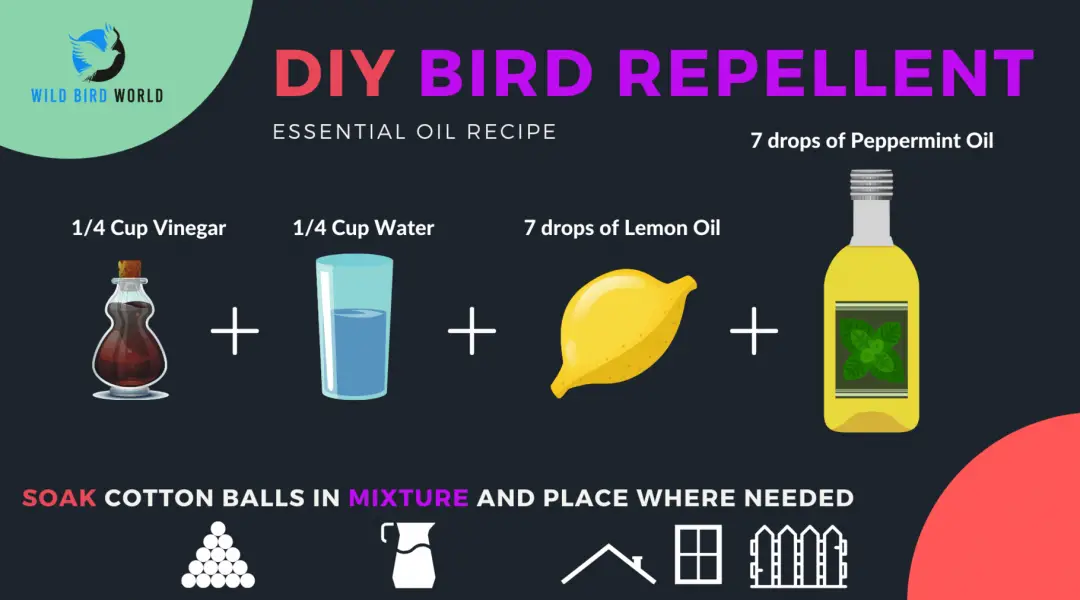
3. Garlic
As well as keeping vampires away, garlic is known to be an offensive smell to a lot of birds.
Natural and cheap, using garlic as a bird deterrent is well worth a go.
You can apply garlic by leaving cloves in areas where birds are a nuisance. Please remember to remove the garlic before it rots!
Another option is to use garlic oil and apply it in a similar way as suggested in #2.
4. Cayenne Pepper
It’s interesting that so many different birds and animals can’t stand the smell of cayenne pepper, yet it seems to be a part of so many recipes.
Cayenne pepper hits the olfactory senses pretty hard, which is why birds want to avoid it.
In addition to birds, skunks also cannot stand the odor that comes from cayenne pepper.
5. Professional Products
If all-natural smell repellents fail, then you can always rely on professional products that are designed to keep birds away.
They often keep birds away by being offensive to multiple senses.
Professional products are more expensive, but often more effective in the long run.
One of the most effective products that I have used is this Bondie Repel-All spray.
It’s bio-degradable and lasts up to 2 months once sprayed!
6. Chili Pepper Mix
While chili pepper alone may not be enough, mixing it with water and apple cider vinegar offers a simple and natural way of deterring birds.
Pour into a spray container a mixture of:
– 24 chili peppers
– half-gallon of water
– quarter-cup of apple cider vinegar
Spray the mixture in troublesome places!
Like any mixture of this nature, it will fade quickly, so you will need to reapply it often.
7. Eucalyptus Oil
Eucalyptus oil has a strong scent that birds dislike. Apply it in a similar fashion as peppermint oil by mixing it with water and spraying it around problem areas or soaking cotton balls in the mixture.
8. Lavender Oil
Lavender oil is another essential oil with a smell that birds find unpleasant. You can use it similarly to other essential oils, either as a spray or by applying it to cotton balls.
9. Citronella Oil
Known for its mosquito-repelling properties, citronella oil is also effective in repelling birds. Place citronella candles or torches around your outdoor space, or create a citronella oil spray to keep birds at bay.
10. Lemongrass Oil
Lemongrass has a citrusy scent that is offensive to birds. Use it in the same way as other essential oils by creating a spray or soaking cotton balls in a lemongrass oil mixture.
11. Apple Cider Vinegar
The strong smell of apple cider vinegar can deter birds. Mix equal parts water and apple cider vinegar in a spray bottle and apply to areas where birds are causing problems.
12. Mothballs
While not a natural solution, mothballs have a pungent odor that birds dislike. Hang them in mesh bags or nylon stockings around problem areas. However, use caution, as mothballs can be toxic to pets and humans if ingested.
What is the benefit of using smells to repel birds?
- Can be placed in hard-to-reach areas
- Subtle alternative to decoys, barriers, or spikes
- Quietly effective, with no need for sound emitters
- Pleasing aromas for humans
How does Smell Affect Birds?
Let’s start with a simple question: “Why do birds have such a keen sense of smell?” It’s not like they’re out there sniffing flowers for fun or trying to find the nearest bakery. But, it turns out that birds have a pretty impressive olfactory system, allowing them to detect and react to various smells. So, when we introduce strong, unpleasant odors to their environment, they’re likely to say, “Nope, not today!” and fly away in search of a more pleasant-smelling location.
Combining Smells: Creating Multi-Scent Bird Deterrents
Why stop at one smell when you can combine them for a veritable bird-repelling party?
Imagine the reaction of birds when they encounter not just one, but a whole medley of offensive odors!
By mixing different smells like garlic, peppermint, and cayenne pepper, you create an aromatic force field that sends birds fleeing in the opposite direction.
How to Apply Smell-Based Bird Repellents Effectively
Birds can be quite stubborn, so you’ll want to ensure you’re using the most effective application techniques for your smell-based bird repellents. Here are a few tips for getting the most out of those potent aromas:
- Soak cotton balls in your chosen repellent mixture and strategically place them in bird-prone areas.
- Use spray bottles to cover larger areas or to target specific spots.
- Hang sachets filled with bird-repellent herbs or spices in areas that are causing problems!
How Often Should You Reapply Bird Repellent Smells?
To maintain the maximum bird-repelling power, you’ll need to reapply your chosen repellent smells regularly.
Natural remedies, such as essential oils or pepper mixtures, tend to fade more quickly and require more frequent reapplication – about every 2-3 days or after heavy rain.
Synthetic repellents might last longer, but it’s always a good idea to check the product label for specific guidelines.
Effectiveness of Natural vs. Synthetic Bird Repellent Smells
The age-old debate of natural versus synthetic bird repellent smells rages on.
While natural solutions are eco-friendly and often smell great to humans, they may require more frequent application.
On the other hand, synthetic repellents often last longer and can be more potent, but they may also come with environmental concerns.
Ultimately, it’s up to you to weigh the pros and cons and choose the best option for your bird-repelling needs.
How to Apply Smell-Based Bird Repellents Effectively
Birds can be quite stubborn, so you’ll want to ensure you’re using the most effective application techniques for your smell-based bird repellents. Here are a few tips for getting the most out of those potent aromas:
- Soak cotton balls in your chosen repellent mixture and strategically place them in bird-prone areas.
- Use spray bottles to cover larger areas or to target specific spots.
- Hang sachets filled with bird-repellent herbs or spices in areas that are causing problems!
Remember, consistency is key, so don’t be shy when it comes to applying those scents!
Some useful links:

About Us
We are avid bird-watchers who recently retired, allowing us more time to travel the world. Fortunately, we have managed to visit numerous countries around Europe, Asia, and America. Watching and photographing birds has been a passion for many years and we are making the most of the extra time on our hands!

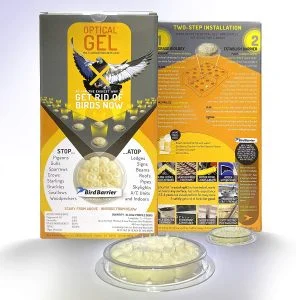
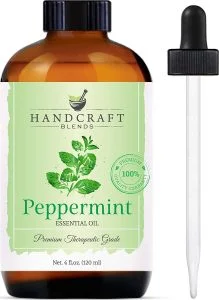
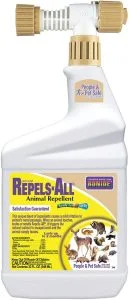
Hi,
I live in a canyon in Los Angeles and for the past few years have had orioles nesting and hatching their young in the tree in front of my apartment. It’s been so wonderful to feel that they found an area that they trusted. I even made sure their nests were left untouched after they left.
This year they did not return. Also, one of my neighbors insisted on putting cedar chips all around the gardens and trees this spring for aesthetic purposes. I was upset as I was not asked if I approved of this. The tree and surrounding area has remained exactly the same since they have been nesting their young.
I am wondering if the cedar chips could be the reason? Or could it be something else?
It saddens me because I feel like a little bit of our local eco system has been affected but maybe it’s because of something else.
Sincerely,
Laurel Adair
-a sincere tree hugger from Canada